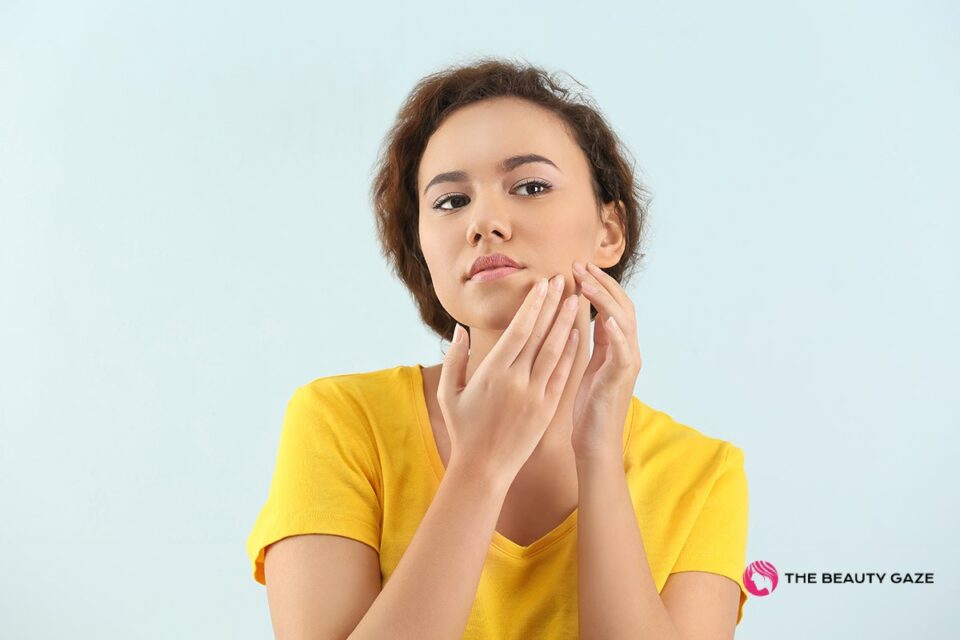Hormonal acne is a skin condition that can affect women of all ages, including teenagers and even older women. But what are the symptoms? Read on to discover common symptoms and causes of hormonal acne.
Table of Contents
What is Hormonal Acne?
Hormonal acne is a form of acne caused by hormonal level changes in the body. Various hormones can play a role in causing acne, including estrogen, progesterone, and testosterone. When these levels are out of balance, they can cause the oil glands to produce more oil, which can then clog the pores and cause acne.
There are many different ways hormonal acne can present itself. The more common ones are:
- Pimples
- Blackheads
- Whiteheads
What can Cause Hormonal Acne
Hormonal acne can develop when changes in hormones increase the oil produced by your skin. This oil, in turn, interacts with the bacteria on the pores of your skin, where hair grows, and this results in acne.
Hormonal acne can be caused by:
- An increase in the production of the estrogen hormone, which can happen during puberty or during periods when women are ovulating. Hormonal acne generally presents itself mildly with a breakout near menstruation, but it also has the potential to persist all month long.
- Birth control pills and hormone replacement therapy. The change in hormonal levels due to contraceptives can cause hormonal acne.
- Pregnancy and the changing levels of hormones that come along with it. Fortunately, acne tends to improve as the pregnancy progresses, and hormones begin to balance once more.
- The decline in reproductive hormones due to menopause can cause hormonal acne due to your body trying to adjust to changing levels.
- Acne may also be caused by bacteria. This is more common in people who have oily skin. While sebum helps to keep the skin healthy, it also attracts bacteria, which explains why acne is more prominent in oily skin. To treat bacterial acne, you need to take good care of your skin and remove as much excess oil from your pores as possible.
Symptoms of Hormonal Acne
Your skin is going to look much different with hormonal acne vs. traditional acne. You may have more redness, inflammation, and tenderness. The skin may also have dry, itchy patches that are uncomfortable. Hormonal acne can be a sign that your hormones are out of balance.
Hormonal acne can show up anywhere on your body, but is more common on the:
- face
- neck
- chest
- shoulders
- back
No matter where they appear, there are treatments for hormonal acne.
Treating Hormonal Acne
Hormonal acne can be annoying and embarrassing to deal with, but it is perfectly natural. There are ways you can rid yourself of it, or at least treat it.
Alter Your Diet
Dietary changes, such as reducing sugar intake or increasing healthy omega-3 fatty acids, can help you in regulating hormone levels and can improve acne symptoms.
Drink Water
Staying hydrated and reducing stress are things that are often overlooked in regard to skincare. Being hydrated allows the body to flush out toxins and unclog the pores that are clogged by dead skin cells and dirt, reducing flare-ups.
Exfoliate regularly
Cleansing with an exfoliating agent helps remove dead skin cells and debris that can contribute to acne. Gently exfoliate a few times a week to make sure your pores remain clear and clean. Use salicylic acid, a pore-clearing ingredient that exfoliates the skin’s surface and penetrates pores to remove excess oil.
No Makeup
Avoid harsh chemicals on your skin when you’re trying to clear up hormonal acne, which can come from makeup. This, unfortunately, can aggravate your condition instead of helping it.
Use Benzoyl peroxide
It helps to reduce inflammation and lowers levels of bacteria.
There are also skin care products for treating hormonal acne on the market at affordable prices, and they work just as well.
Know the Symptoms
If you’re struggling with hormonal acne, it’s important to know the symptoms that can indicate you have the condition. This way, you can start making more informed decisions about your treatment and lifestyle choices to get relief. Use the tips above to get some relief from the condition.


